Impact of Professional Development
VerifiedAdded on 2020/06/06
|14
|4057
|494
AI Summary
This assignment delves into the crucial role of professional development in shaping teacher effectiveness and enhancing student achievement. It examines various forms of professional development, their impact on pedagogical practices, and the connection between teachers' growth and positive learning experiences for students. The analysis draws upon scholarly research and insights to illuminate the multifaceted benefits of effective professional development initiatives.
Contribute Materials
Your contribution can guide someone’s learning journey. Share your
documents today.
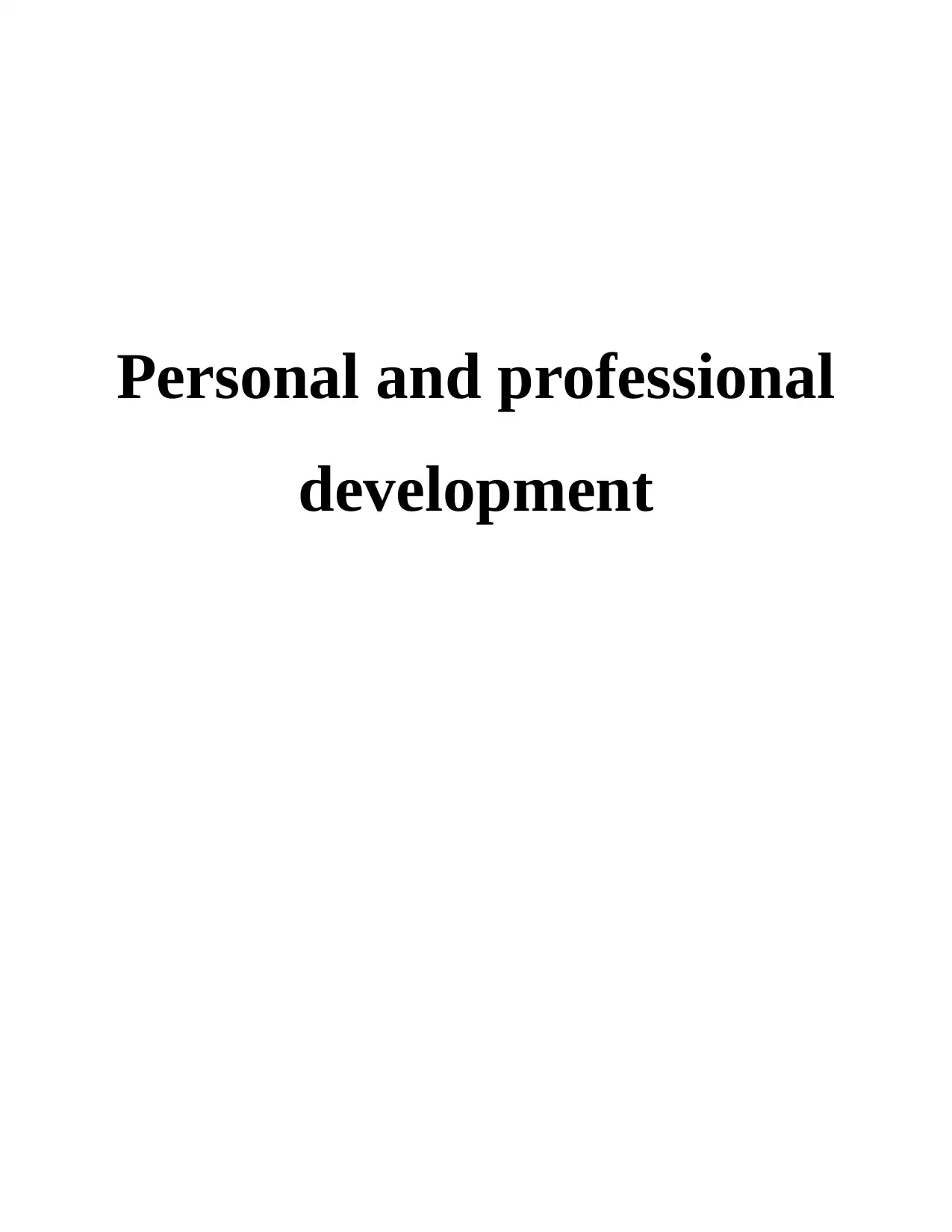
Personal and professional
development
development
Secure Best Marks with AI Grader
Need help grading? Try our AI Grader for instant feedback on your assignments.
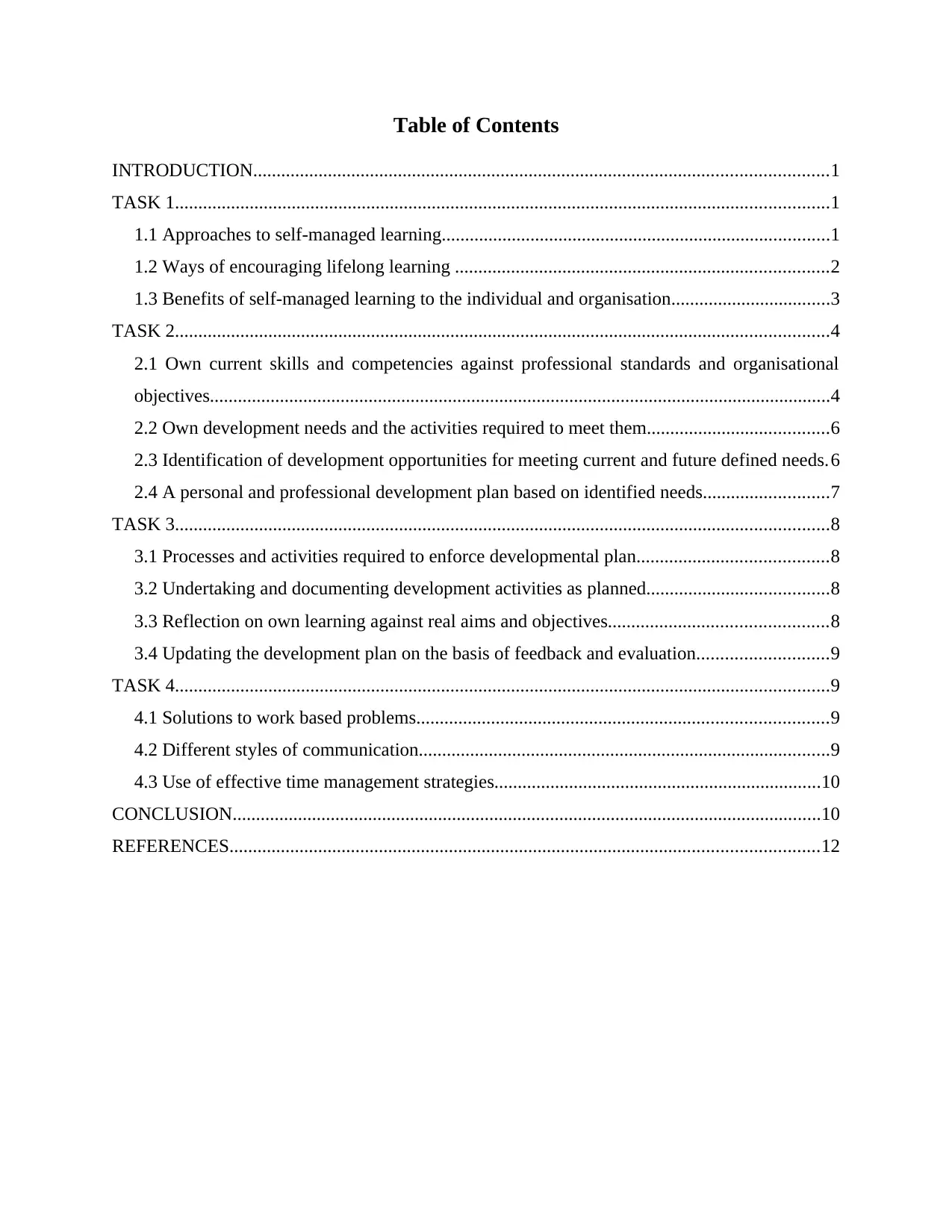
Table of Contents
INTRODUCTION...........................................................................................................................1
TASK 1............................................................................................................................................1
1.1 Approaches to self-managed learning...................................................................................1
1.2 Ways of encouraging lifelong learning ................................................................................2
1.3 Benefits of self-managed learning to the individual and organisation..................................3
TASK 2............................................................................................................................................4
2.1 Own current skills and competencies against professional standards and organisational
objectives.....................................................................................................................................4
2.2 Own development needs and the activities required to meet them.......................................6
2.3 Identification of development opportunities for meeting current and future defined needs.6
2.4 A personal and professional development plan based on identified needs...........................7
TASK 3............................................................................................................................................8
3.1 Processes and activities required to enforce developmental plan.........................................8
3.2 Undertaking and documenting development activities as planned.......................................8
3.3 Reflection on own learning against real aims and objectives...............................................8
3.4 Updating the development plan on the basis of feedback and evaluation............................9
TASK 4............................................................................................................................................9
4.1 Solutions to work based problems........................................................................................9
4.2 Different styles of communication........................................................................................9
4.3 Use of effective time management strategies......................................................................10
CONCLUSION..............................................................................................................................10
REFERENCES..............................................................................................................................12
INTRODUCTION...........................................................................................................................1
TASK 1............................................................................................................................................1
1.1 Approaches to self-managed learning...................................................................................1
1.2 Ways of encouraging lifelong learning ................................................................................2
1.3 Benefits of self-managed learning to the individual and organisation..................................3
TASK 2............................................................................................................................................4
2.1 Own current skills and competencies against professional standards and organisational
objectives.....................................................................................................................................4
2.2 Own development needs and the activities required to meet them.......................................6
2.3 Identification of development opportunities for meeting current and future defined needs.6
2.4 A personal and professional development plan based on identified needs...........................7
TASK 3............................................................................................................................................8
3.1 Processes and activities required to enforce developmental plan.........................................8
3.2 Undertaking and documenting development activities as planned.......................................8
3.3 Reflection on own learning against real aims and objectives...............................................8
3.4 Updating the development plan on the basis of feedback and evaluation............................9
TASK 4............................................................................................................................................9
4.1 Solutions to work based problems........................................................................................9
4.2 Different styles of communication........................................................................................9
4.3 Use of effective time management strategies......................................................................10
CONCLUSION..............................................................................................................................10
REFERENCES..............................................................................................................................12
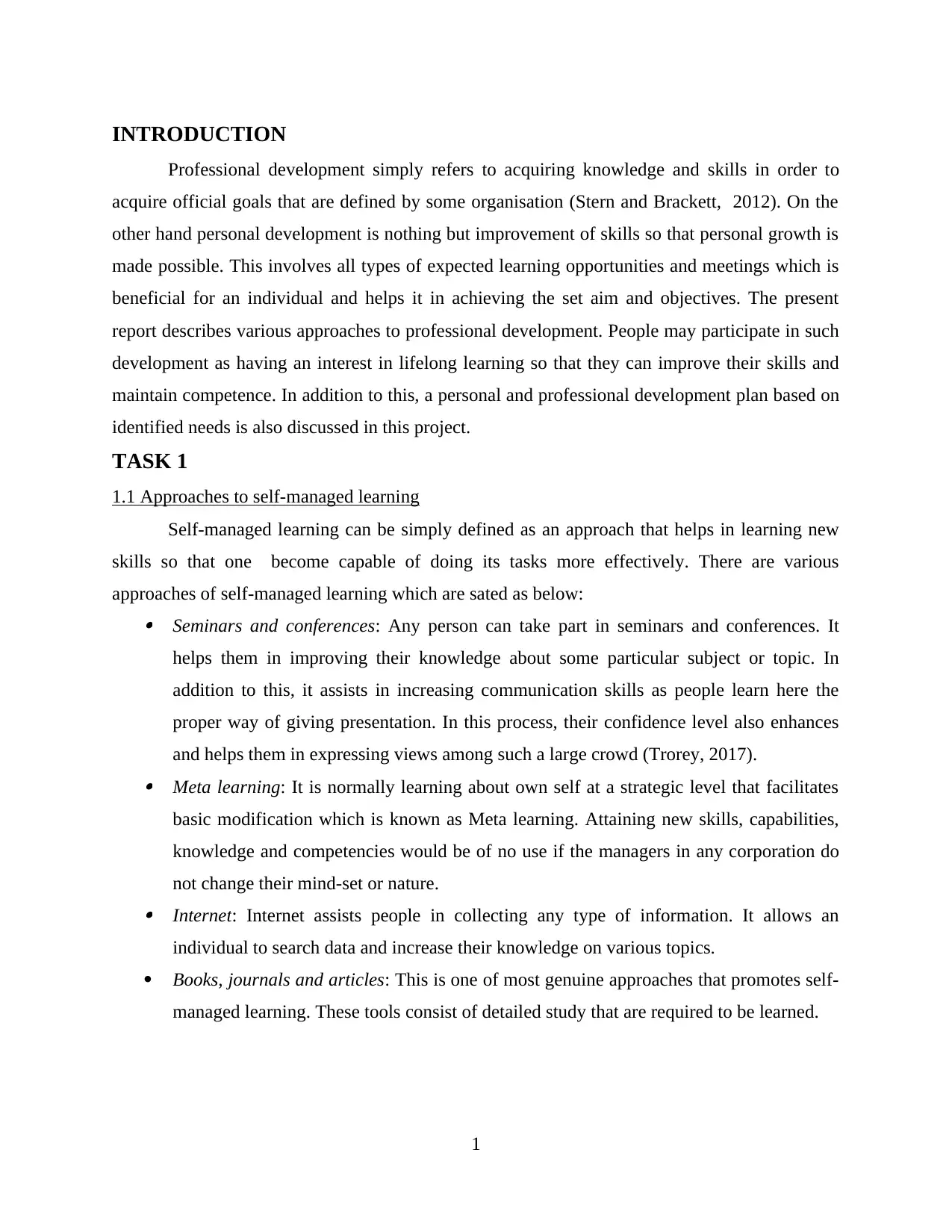
INTRODUCTION
Professional development simply refers to acquiring knowledge and skills in order to
acquire official goals that are defined by some organisation (Stern and Brackett, 2012). On the
other hand personal development is nothing but improvement of skills so that personal growth is
made possible. This involves all types of expected learning opportunities and meetings which is
beneficial for an individual and helps it in achieving the set aim and objectives. The present
report describes various approaches to professional development. People may participate in such
development as having an interest in lifelong learning so that they can improve their skills and
maintain competence. In addition to this, a personal and professional development plan based on
identified needs is also discussed in this project.
TASK 1
1.1 Approaches to self-managed learning
Self-managed learning can be simply defined as an approach that helps in learning new
skills so that one become capable of doing its tasks more effectively. There are various
approaches of self-managed learning which are sated as below: Seminars and conferences: Any person can take part in seminars and conferences. It
helps them in improving their knowledge about some particular subject or topic. In
addition to this, it assists in increasing communication skills as people learn here the
proper way of giving presentation. In this process, their confidence level also enhances
and helps them in expressing views among such a large crowd (Trorey, 2017). Meta learning: It is normally learning about own self at a strategic level that facilitates
basic modification which is known as Meta learning. Attaining new skills, capabilities,
knowledge and competencies would be of no use if the managers in any corporation do
not change their mind-set or nature. Internet: Internet assists people in collecting any type of information. It allows an
individual to search data and increase their knowledge on various topics.
Books, journals and articles: This is one of most genuine approaches that promotes self-
managed learning. These tools consist of detailed study that are required to be learned.
1
Professional development simply refers to acquiring knowledge and skills in order to
acquire official goals that are defined by some organisation (Stern and Brackett, 2012). On the
other hand personal development is nothing but improvement of skills so that personal growth is
made possible. This involves all types of expected learning opportunities and meetings which is
beneficial for an individual and helps it in achieving the set aim and objectives. The present
report describes various approaches to professional development. People may participate in such
development as having an interest in lifelong learning so that they can improve their skills and
maintain competence. In addition to this, a personal and professional development plan based on
identified needs is also discussed in this project.
TASK 1
1.1 Approaches to self-managed learning
Self-managed learning can be simply defined as an approach that helps in learning new
skills so that one become capable of doing its tasks more effectively. There are various
approaches of self-managed learning which are sated as below: Seminars and conferences: Any person can take part in seminars and conferences. It
helps them in improving their knowledge about some particular subject or topic. In
addition to this, it assists in increasing communication skills as people learn here the
proper way of giving presentation. In this process, their confidence level also enhances
and helps them in expressing views among such a large crowd (Trorey, 2017). Meta learning: It is normally learning about own self at a strategic level that facilitates
basic modification which is known as Meta learning. Attaining new skills, capabilities,
knowledge and competencies would be of no use if the managers in any corporation do
not change their mind-set or nature. Internet: Internet assists people in collecting any type of information. It allows an
individual to search data and increase their knowledge on various topics.
Books, journals and articles: This is one of most genuine approaches that promotes self-
managed learning. These tools consist of detailed study that are required to be learned.
1
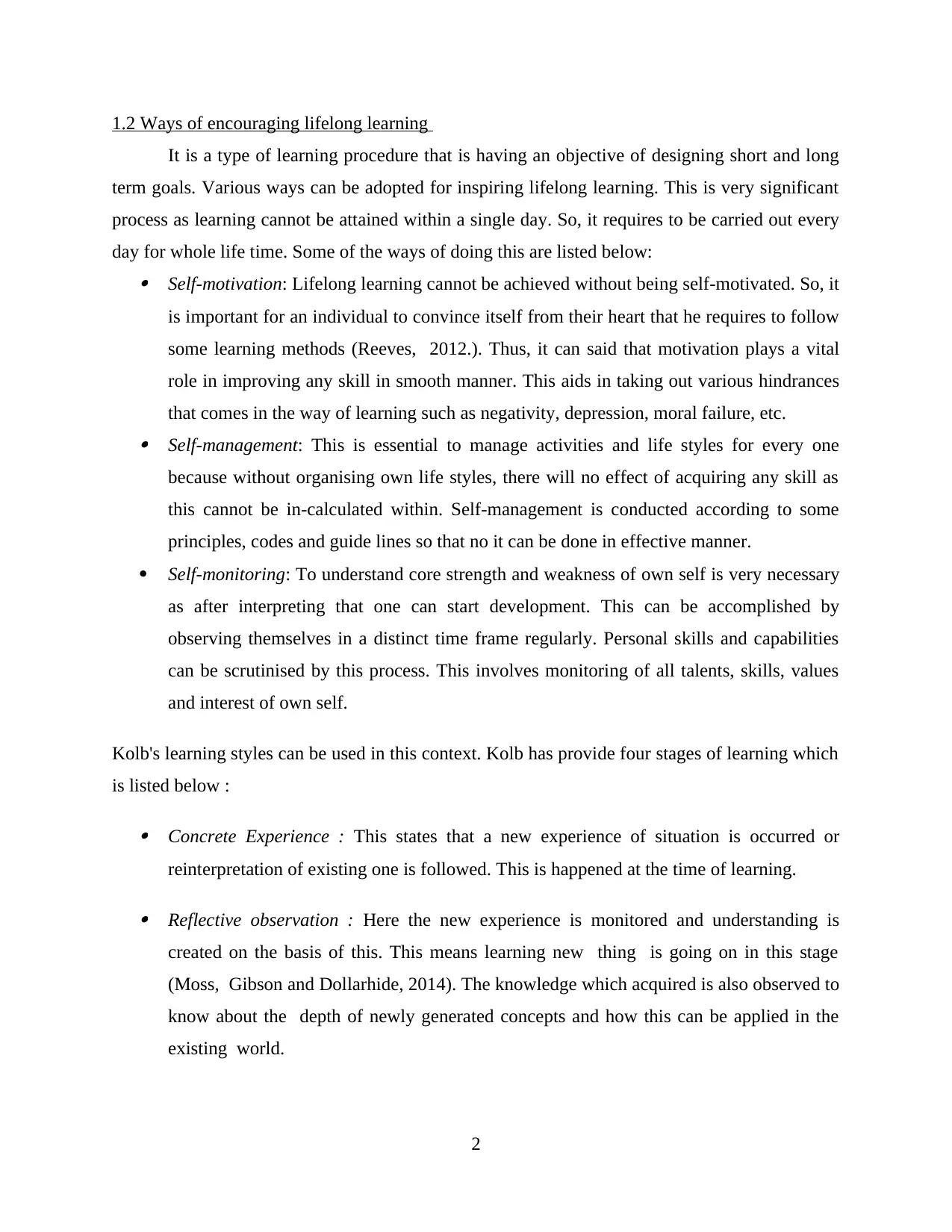
1.2 Ways of encouraging lifelong learning
It is a type of learning procedure that is having an objective of designing short and long
term goals. Various ways can be adopted for inspiring lifelong learning. This is very significant
process as learning cannot be attained within a single day. So, it requires to be carried out every
day for whole life time. Some of the ways of doing this are listed below: Self-motivation: Lifelong learning cannot be achieved without being self-motivated. So, it
is important for an individual to convince itself from their heart that he requires to follow
some learning methods (Reeves, 2012.). Thus, it can said that motivation plays a vital
role in improving any skill in smooth manner. This aids in taking out various hindrances
that comes in the way of learning such as negativity, depression, moral failure, etc. Self-management: This is essential to manage activities and life styles for every one
because without organising own life styles, there will no effect of acquiring any skill as
this cannot be in-calculated within. Self-management is conducted according to some
principles, codes and guide lines so that no it can be done in effective manner.
Self-monitoring: To understand core strength and weakness of own self is very necessary
as after interpreting that one can start development. This can be accomplished by
observing themselves in a distinct time frame regularly. Personal skills and capabilities
can be scrutinised by this process. This involves monitoring of all talents, skills, values
and interest of own self.
Kolb's learning styles can be used in this context. Kolb has provide four stages of learning which
is listed below :
Concrete Experience : This states that a new experience of situation is occurred or
reinterpretation of existing one is followed. This is happened at the time of learning.
Reflective observation : Here the new experience is monitored and understanding is
created on the basis of this. This means learning new thing is going on in this stage
(Moss, Gibson and Dollarhide, 2014). The knowledge which acquired is also observed to
know about the depth of newly generated concepts and how this can be applied in the
existing world.
2
It is a type of learning procedure that is having an objective of designing short and long
term goals. Various ways can be adopted for inspiring lifelong learning. This is very significant
process as learning cannot be attained within a single day. So, it requires to be carried out every
day for whole life time. Some of the ways of doing this are listed below: Self-motivation: Lifelong learning cannot be achieved without being self-motivated. So, it
is important for an individual to convince itself from their heart that he requires to follow
some learning methods (Reeves, 2012.). Thus, it can said that motivation plays a vital
role in improving any skill in smooth manner. This aids in taking out various hindrances
that comes in the way of learning such as negativity, depression, moral failure, etc. Self-management: This is essential to manage activities and life styles for every one
because without organising own life styles, there will no effect of acquiring any skill as
this cannot be in-calculated within. Self-management is conducted according to some
principles, codes and guide lines so that no it can be done in effective manner.
Self-monitoring: To understand core strength and weakness of own self is very necessary
as after interpreting that one can start development. This can be accomplished by
observing themselves in a distinct time frame regularly. Personal skills and capabilities
can be scrutinised by this process. This involves monitoring of all talents, skills, values
and interest of own self.
Kolb's learning styles can be used in this context. Kolb has provide four stages of learning which
is listed below :
Concrete Experience : This states that a new experience of situation is occurred or
reinterpretation of existing one is followed. This is happened at the time of learning.
Reflective observation : Here the new experience is monitored and understanding is
created on the basis of this. This means learning new thing is going on in this stage
(Moss, Gibson and Dollarhide, 2014). The knowledge which acquired is also observed to
know about the depth of newly generated concepts and how this can be applied in the
existing world.
2
Secure Best Marks with AI Grader
Need help grading? Try our AI Grader for instant feedback on your assignments.
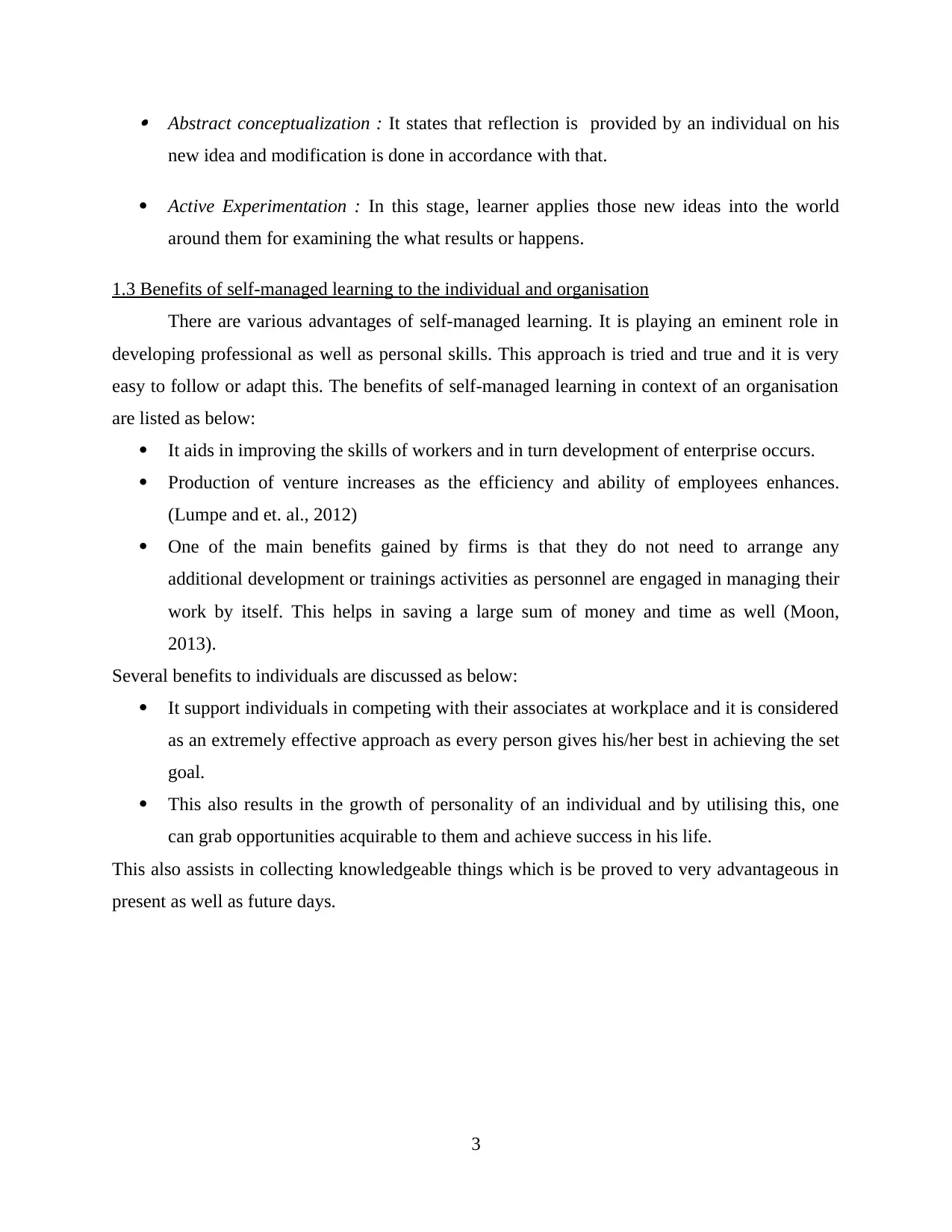
Abstract conceptualization : It states that reflection is provided by an individual on his
new idea and modification is done in accordance with that.
Active Experimentation : In this stage, learner applies those new ideas into the world
around them for examining the what results or happens.
1.3 Benefits of self-managed learning to the individual and organisation
There are various advantages of self-managed learning. It is playing an eminent role in
developing professional as well as personal skills. This approach is tried and true and it is very
easy to follow or adapt this. The benefits of self-managed learning in context of an organisation
are listed as below:
It aids in improving the skills of workers and in turn development of enterprise occurs.
Production of venture increases as the efficiency and ability of employees enhances.
(Lumpe and et. al., 2012)
One of the main benefits gained by firms is that they do not need to arrange any
additional development or trainings activities as personnel are engaged in managing their
work by itself. This helps in saving a large sum of money and time as well (Moon,
2013).
Several benefits to individuals are discussed as below:
It support individuals in competing with their associates at workplace and it is considered
as an extremely effective approach as every person gives his/her best in achieving the set
goal.
This also results in the growth of personality of an individual and by utilising this, one
can grab opportunities acquirable to them and achieve success in his life.
This also assists in collecting knowledgeable things which is be proved to very advantageous in
present as well as future days.
3
new idea and modification is done in accordance with that.
Active Experimentation : In this stage, learner applies those new ideas into the world
around them for examining the what results or happens.
1.3 Benefits of self-managed learning to the individual and organisation
There are various advantages of self-managed learning. It is playing an eminent role in
developing professional as well as personal skills. This approach is tried and true and it is very
easy to follow or adapt this. The benefits of self-managed learning in context of an organisation
are listed as below:
It aids in improving the skills of workers and in turn development of enterprise occurs.
Production of venture increases as the efficiency and ability of employees enhances.
(Lumpe and et. al., 2012)
One of the main benefits gained by firms is that they do not need to arrange any
additional development or trainings activities as personnel are engaged in managing their
work by itself. This helps in saving a large sum of money and time as well (Moon,
2013).
Several benefits to individuals are discussed as below:
It support individuals in competing with their associates at workplace and it is considered
as an extremely effective approach as every person gives his/her best in achieving the set
goal.
This also results in the growth of personality of an individual and by utilising this, one
can grab opportunities acquirable to them and achieve success in his life.
This also assists in collecting knowledgeable things which is be proved to very advantageous in
present as well as future days.
3
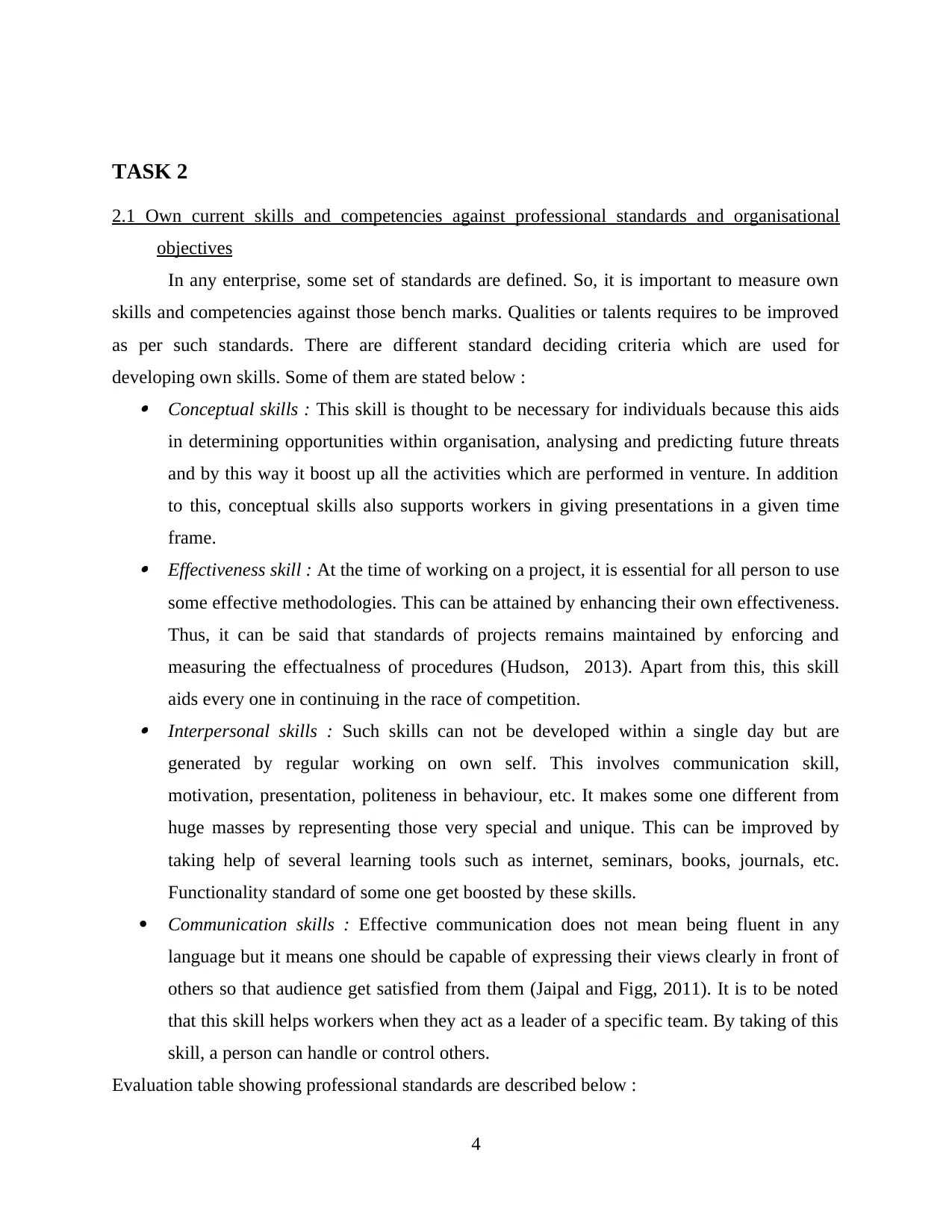
TASK 2
2.1 Own current skills and competencies against professional standards and organisational
objectives
In any enterprise, some set of standards are defined. So, it is important to measure own
skills and competencies against those bench marks. Qualities or talents requires to be improved
as per such standards. There are different standard deciding criteria which are used for
developing own skills. Some of them are stated below : Conceptual skills : This skill is thought to be necessary for individuals because this aids
in determining opportunities within organisation, analysing and predicting future threats
and by this way it boost up all the activities which are performed in venture. In addition
to this, conceptual skills also supports workers in giving presentations in a given time
frame. Effectiveness skill : At the time of working on a project, it is essential for all person to use
some effective methodologies. This can be attained by enhancing their own effectiveness.
Thus, it can be said that standards of projects remains maintained by enforcing and
measuring the effectualness of procedures (Hudson, 2013). Apart from this, this skill
aids every one in continuing in the race of competition. Interpersonal skills : Such skills can not be developed within a single day but are
generated by regular working on own self. This involves communication skill,
motivation, presentation, politeness in behaviour, etc. It makes some one different from
huge masses by representing those very special and unique. This can be improved by
taking help of several learning tools such as internet, seminars, books, journals, etc.
Functionality standard of some one get boosted by these skills.
Communication skills : Effective communication does not mean being fluent in any
language but it means one should be capable of expressing their views clearly in front of
others so that audience get satisfied from them (Jaipal and Figg, 2011). It is to be noted
that this skill helps workers when they act as a leader of a specific team. By taking of this
skill, a person can handle or control others.
Evaluation table showing professional standards are described below :
4
2.1 Own current skills and competencies against professional standards and organisational
objectives
In any enterprise, some set of standards are defined. So, it is important to measure own
skills and competencies against those bench marks. Qualities or talents requires to be improved
as per such standards. There are different standard deciding criteria which are used for
developing own skills. Some of them are stated below : Conceptual skills : This skill is thought to be necessary for individuals because this aids
in determining opportunities within organisation, analysing and predicting future threats
and by this way it boost up all the activities which are performed in venture. In addition
to this, conceptual skills also supports workers in giving presentations in a given time
frame. Effectiveness skill : At the time of working on a project, it is essential for all person to use
some effective methodologies. This can be attained by enhancing their own effectiveness.
Thus, it can be said that standards of projects remains maintained by enforcing and
measuring the effectualness of procedures (Hudson, 2013). Apart from this, this skill
aids every one in continuing in the race of competition. Interpersonal skills : Such skills can not be developed within a single day but are
generated by regular working on own self. This involves communication skill,
motivation, presentation, politeness in behaviour, etc. It makes some one different from
huge masses by representing those very special and unique. This can be improved by
taking help of several learning tools such as internet, seminars, books, journals, etc.
Functionality standard of some one get boosted by these skills.
Communication skills : Effective communication does not mean being fluent in any
language but it means one should be capable of expressing their views clearly in front of
others so that audience get satisfied from them (Jaipal and Figg, 2011). It is to be noted
that this skill helps workers when they act as a leader of a specific team. By taking of this
skill, a person can handle or control others.
Evaluation table showing professional standards are described below :
4
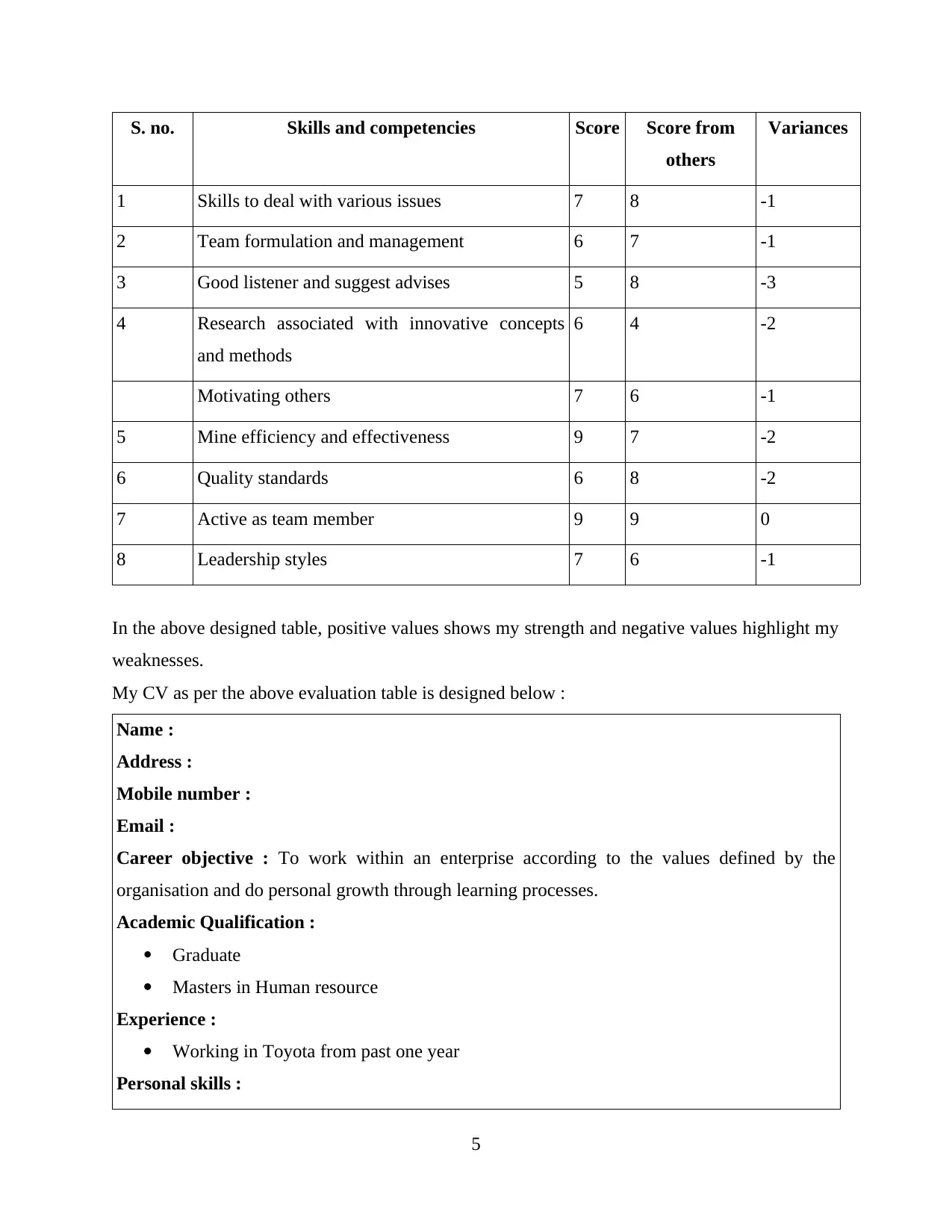
S. no. Skills and competencies Score Score from
others
Variances
1 Skills to deal with various issues 7 8 -1
2 Team formulation and management 6 7 -1
3 Good listener and suggest advises 5 8 -3
4 Research associated with innovative concepts
and methods
6 4 -2
Motivating others 7 6 -1
5 Mine efficiency and effectiveness 9 7 -2
6 Quality standards 6 8 -2
7 Active as team member 9 9 0
8 Leadership styles 7 6 -1
In the above designed table, positive values shows my strength and negative values highlight my
weaknesses.
My CV as per the above evaluation table is designed below :
Name :
Address :
Mobile number :
Email :
Career objective : To work within an enterprise according to the values defined by the
organisation and do personal growth through learning processes.
Academic Qualification :
Graduate
Masters in Human resource
Experience :
Working in Toyota from past one year
Personal skills :
5
others
Variances
1 Skills to deal with various issues 7 8 -1
2 Team formulation and management 6 7 -1
3 Good listener and suggest advises 5 8 -3
4 Research associated with innovative concepts
and methods
6 4 -2
Motivating others 7 6 -1
5 Mine efficiency and effectiveness 9 7 -2
6 Quality standards 6 8 -2
7 Active as team member 9 9 0
8 Leadership styles 7 6 -1
In the above designed table, positive values shows my strength and negative values highlight my
weaknesses.
My CV as per the above evaluation table is designed below :
Name :
Address :
Mobile number :
Email :
Career objective : To work within an enterprise according to the values defined by the
organisation and do personal growth through learning processes.
Academic Qualification :
Graduate
Masters in Human resource
Experience :
Working in Toyota from past one year
Personal skills :
5
Paraphrase This Document
Need a fresh take? Get an instant paraphrase of this document with our AI Paraphraser
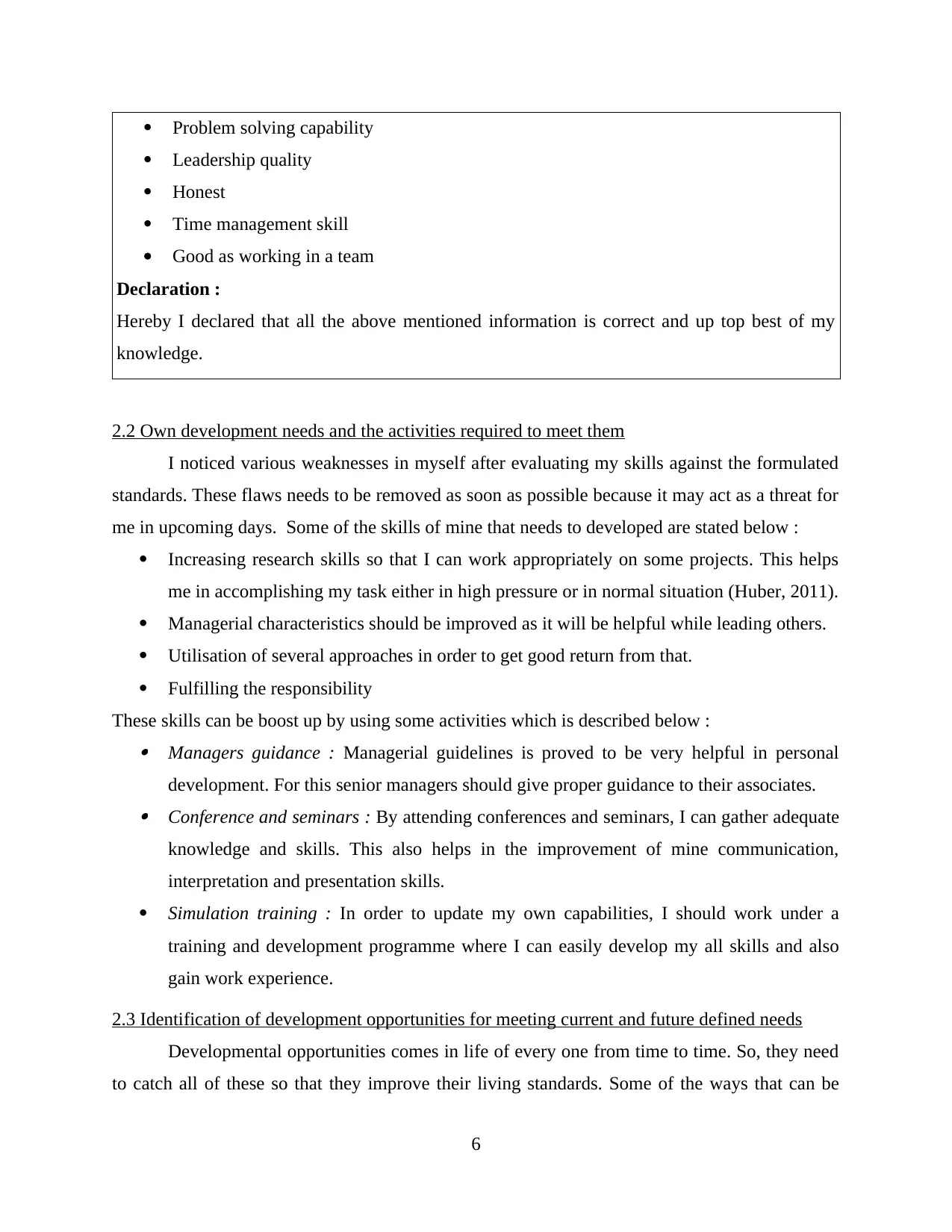
Problem solving capability
Leadership quality
Honest
Time management skill
Good as working in a team
Declaration :
Hereby I declared that all the above mentioned information is correct and up top best of my
knowledge.
2.2 Own development needs and the activities required to meet them
I noticed various weaknesses in myself after evaluating my skills against the formulated
standards. These flaws needs to be removed as soon as possible because it may act as a threat for
me in upcoming days. Some of the skills of mine that needs to developed are stated below :
Increasing research skills so that I can work appropriately on some projects. This helps
me in accomplishing my task either in high pressure or in normal situation (Huber, 2011).
Managerial characteristics should be improved as it will be helpful while leading others.
Utilisation of several approaches in order to get good return from that.
Fulfilling the responsibility
These skills can be boost up by using some activities which is described below : Managers guidance : Managerial guidelines is proved to be very helpful in personal
development. For this senior managers should give proper guidance to their associates. Conference and seminars : By attending conferences and seminars, I can gather adequate
knowledge and skills. This also helps in the improvement of mine communication,
interpretation and presentation skills.
Simulation training : In order to update my own capabilities, I should work under a
training and development programme where I can easily develop my all skills and also
gain work experience.
2.3 Identification of development opportunities for meeting current and future defined needs
Developmental opportunities comes in life of every one from time to time. So, they need
to catch all of these so that they improve their living standards. Some of the ways that can be
6
Leadership quality
Honest
Time management skill
Good as working in a team
Declaration :
Hereby I declared that all the above mentioned information is correct and up top best of my
knowledge.
2.2 Own development needs and the activities required to meet them
I noticed various weaknesses in myself after evaluating my skills against the formulated
standards. These flaws needs to be removed as soon as possible because it may act as a threat for
me in upcoming days. Some of the skills of mine that needs to developed are stated below :
Increasing research skills so that I can work appropriately on some projects. This helps
me in accomplishing my task either in high pressure or in normal situation (Huber, 2011).
Managerial characteristics should be improved as it will be helpful while leading others.
Utilisation of several approaches in order to get good return from that.
Fulfilling the responsibility
These skills can be boost up by using some activities which is described below : Managers guidance : Managerial guidelines is proved to be very helpful in personal
development. For this senior managers should give proper guidance to their associates. Conference and seminars : By attending conferences and seminars, I can gather adequate
knowledge and skills. This also helps in the improvement of mine communication,
interpretation and presentation skills.
Simulation training : In order to update my own capabilities, I should work under a
training and development programme where I can easily develop my all skills and also
gain work experience.
2.3 Identification of development opportunities for meeting current and future defined needs
Developmental opportunities comes in life of every one from time to time. So, they need
to catch all of these so that they improve their living standards. Some of the ways that can be
6
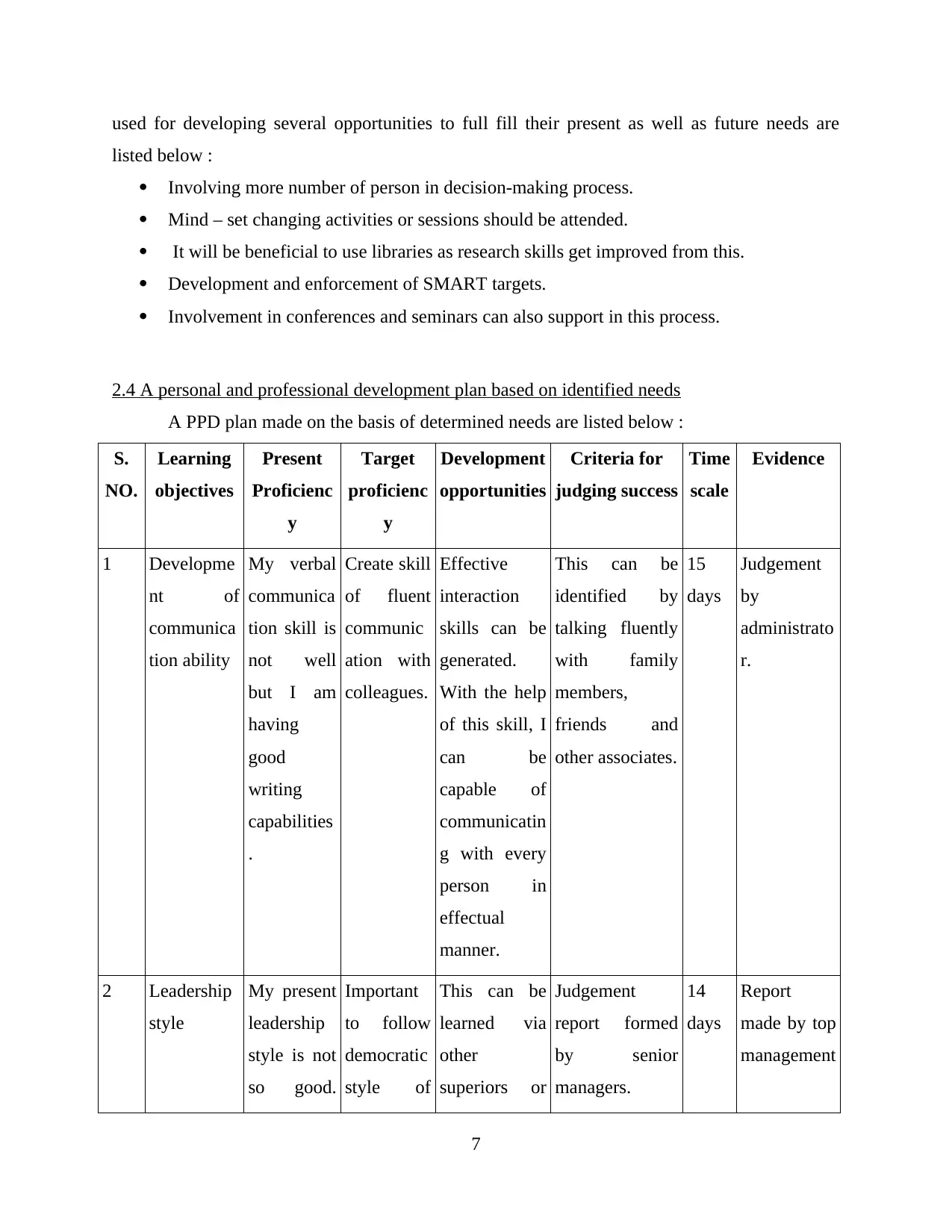
used for developing several opportunities to full fill their present as well as future needs are
listed below :
Involving more number of person in decision-making process.
Mind – set changing activities or sessions should be attended.
It will be beneficial to use libraries as research skills get improved from this.
Development and enforcement of SMART targets.
Involvement in conferences and seminars can also support in this process.
2.4 A personal and professional development plan based on identified needs
A PPD plan made on the basis of determined needs are listed below :
S.
NO.
Learning
objectives
Present
Proficienc
y
Target
proficienc
y
Development
opportunities
Criteria for
judging success
Time
scale
Evidence
1 Developme
nt of
communica
tion ability
My verbal
communica
tion skill is
not well
but I am
having
good
writing
capabilities
.
Create skill
of fluent
communic
ation with
colleagues.
Effective
interaction
skills can be
generated.
With the help
of this skill, I
can be
capable of
communicatin
g with every
person in
effectual
manner.
This can be
identified by
talking fluently
with family
members,
friends and
other associates.
15
days
Judgement
by
administrato
r.
2 Leadership
style
My present
leadership
style is not
so good.
Important
to follow
democratic
style of
This can be
learned via
other
superiors or
Judgement
report formed
by senior
managers.
14
days
Report
made by top
management
7
listed below :
Involving more number of person in decision-making process.
Mind – set changing activities or sessions should be attended.
It will be beneficial to use libraries as research skills get improved from this.
Development and enforcement of SMART targets.
Involvement in conferences and seminars can also support in this process.
2.4 A personal and professional development plan based on identified needs
A PPD plan made on the basis of determined needs are listed below :
S.
NO.
Learning
objectives
Present
Proficienc
y
Target
proficienc
y
Development
opportunities
Criteria for
judging success
Time
scale
Evidence
1 Developme
nt of
communica
tion ability
My verbal
communica
tion skill is
not well
but I am
having
good
writing
capabilities
.
Create skill
of fluent
communic
ation with
colleagues.
Effective
interaction
skills can be
generated.
With the help
of this skill, I
can be
capable of
communicatin
g with every
person in
effectual
manner.
This can be
identified by
talking fluently
with family
members,
friends and
other associates.
15
days
Judgement
by
administrato
r.
2 Leadership
style
My present
leadership
style is not
so good.
Important
to follow
democratic
style of
This can be
learned via
other
superiors or
Judgement
report formed
by senior
managers.
14
days
Report
made by top
management
7
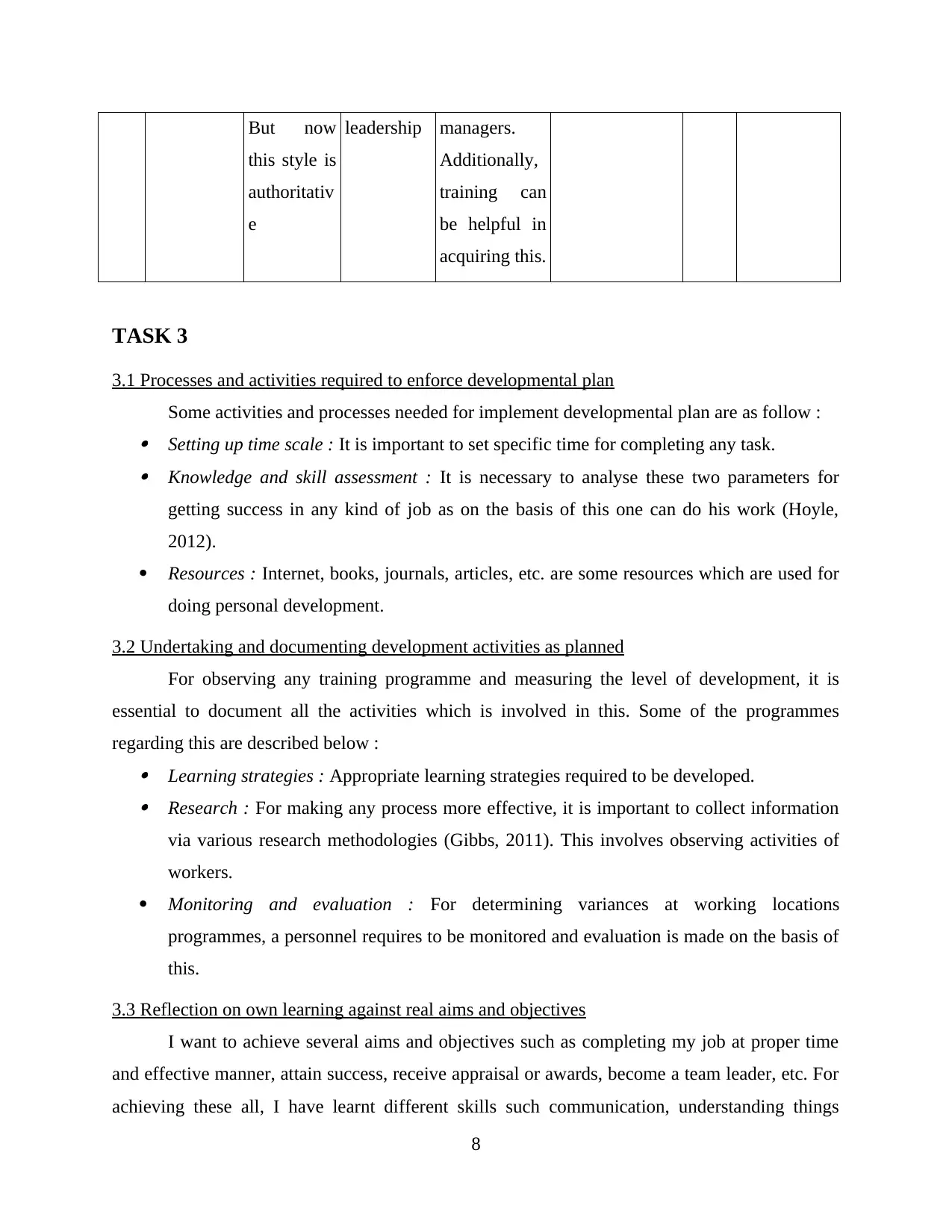
But now
this style is
authoritativ
e
leadership managers.
Additionally,
training can
be helpful in
acquiring this.
TASK 3
3.1 Processes and activities required to enforce developmental plan
Some activities and processes needed for implement developmental plan are as follow : Setting up time scale : It is important to set specific time for completing any task. Knowledge and skill assessment : It is necessary to analyse these two parameters for
getting success in any kind of job as on the basis of this one can do his work (Hoyle,
2012).
Resources : Internet, books, journals, articles, etc. are some resources which are used for
doing personal development.
3.2 Undertaking and documenting development activities as planned
For observing any training programme and measuring the level of development, it is
essential to document all the activities which is involved in this. Some of the programmes
regarding this are described below : Learning strategies : Appropriate learning strategies required to be developed. Research : For making any process more effective, it is important to collect information
via various research methodologies (Gibbs, 2011). This involves observing activities of
workers.
Monitoring and evaluation : For determining variances at working locations
programmes, a personnel requires to be monitored and evaluation is made on the basis of
this.
3.3 Reflection on own learning against real aims and objectives
I want to achieve several aims and objectives such as completing my job at proper time
and effective manner, attain success, receive appraisal or awards, become a team leader, etc. For
achieving these all, I have learnt different skills such communication, understanding things
8
this style is
authoritativ
e
leadership managers.
Additionally,
training can
be helpful in
acquiring this.
TASK 3
3.1 Processes and activities required to enforce developmental plan
Some activities and processes needed for implement developmental plan are as follow : Setting up time scale : It is important to set specific time for completing any task. Knowledge and skill assessment : It is necessary to analyse these two parameters for
getting success in any kind of job as on the basis of this one can do his work (Hoyle,
2012).
Resources : Internet, books, journals, articles, etc. are some resources which are used for
doing personal development.
3.2 Undertaking and documenting development activities as planned
For observing any training programme and measuring the level of development, it is
essential to document all the activities which is involved in this. Some of the programmes
regarding this are described below : Learning strategies : Appropriate learning strategies required to be developed. Research : For making any process more effective, it is important to collect information
via various research methodologies (Gibbs, 2011). This involves observing activities of
workers.
Monitoring and evaluation : For determining variances at working locations
programmes, a personnel requires to be monitored and evaluation is made on the basis of
this.
3.3 Reflection on own learning against real aims and objectives
I want to achieve several aims and objectives such as completing my job at proper time
and effective manner, attain success, receive appraisal or awards, become a team leader, etc. For
achieving these all, I have learnt different skills such communication, understanding things
8
Secure Best Marks with AI Grader
Need help grading? Try our AI Grader for instant feedback on your assignments.
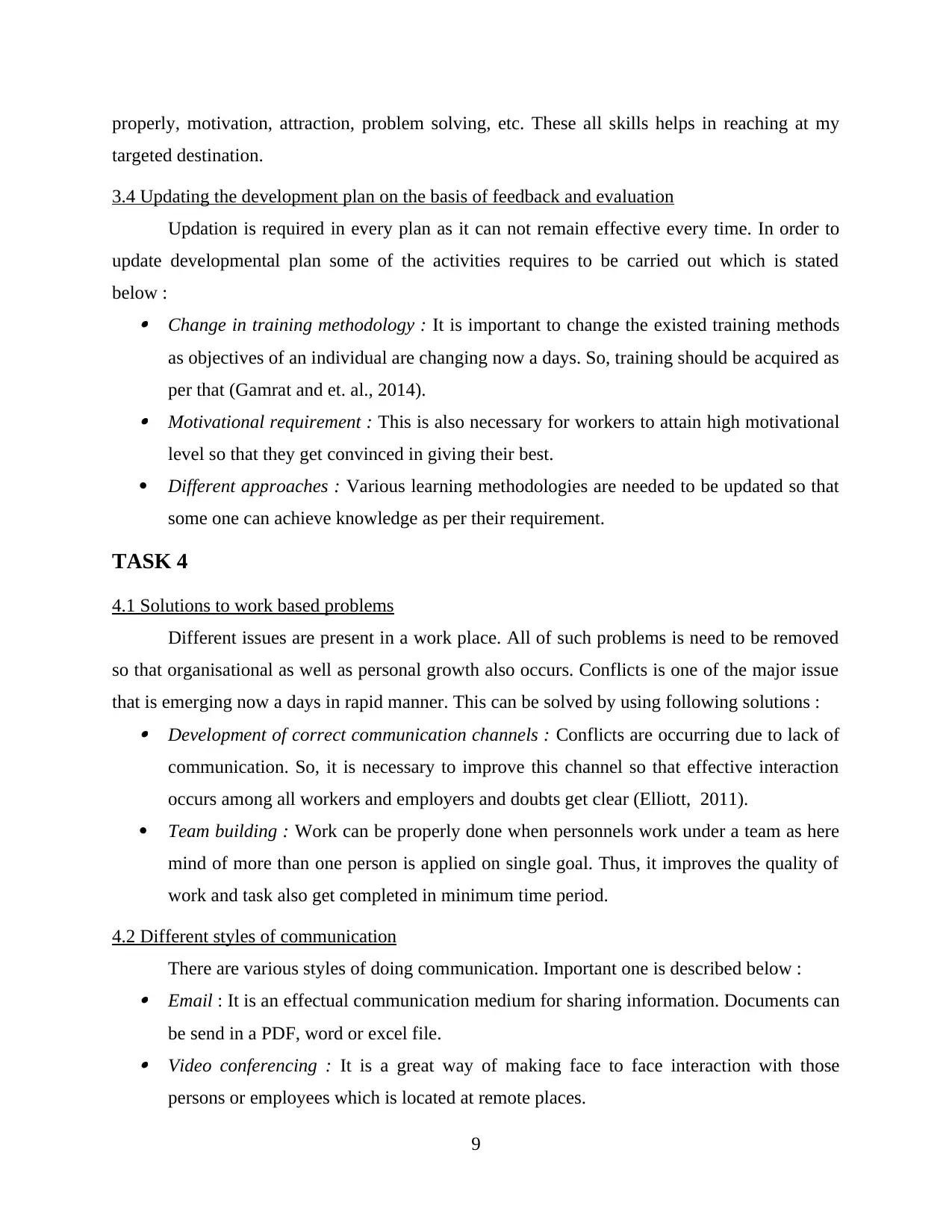
properly, motivation, attraction, problem solving, etc. These all skills helps in reaching at my
targeted destination.
3.4 Updating the development plan on the basis of feedback and evaluation
Updation is required in every plan as it can not remain effective every time. In order to
update developmental plan some of the activities requires to be carried out which is stated
below : Change in training methodology : It is important to change the existed training methods
as objectives of an individual are changing now a days. So, training should be acquired as
per that (Gamrat and et. al., 2014). Motivational requirement : This is also necessary for workers to attain high motivational
level so that they get convinced in giving their best.
Different approaches : Various learning methodologies are needed to be updated so that
some one can achieve knowledge as per their requirement.
TASK 4
4.1 Solutions to work based problems
Different issues are present in a work place. All of such problems is need to be removed
so that organisational as well as personal growth also occurs. Conflicts is one of the major issue
that is emerging now a days in rapid manner. This can be solved by using following solutions : Development of correct communication channels : Conflicts are occurring due to lack of
communication. So, it is necessary to improve this channel so that effective interaction
occurs among all workers and employers and doubts get clear (Elliott, 2011).
Team building : Work can be properly done when personnels work under a team as here
mind of more than one person is applied on single goal. Thus, it improves the quality of
work and task also get completed in minimum time period.
4.2 Different styles of communication
There are various styles of doing communication. Important one is described below : Email : It is an effectual communication medium for sharing information. Documents can
be send in a PDF, word or excel file. Video conferencing : It is a great way of making face to face interaction with those
persons or employees which is located at remote places.
9
targeted destination.
3.4 Updating the development plan on the basis of feedback and evaluation
Updation is required in every plan as it can not remain effective every time. In order to
update developmental plan some of the activities requires to be carried out which is stated
below : Change in training methodology : It is important to change the existed training methods
as objectives of an individual are changing now a days. So, training should be acquired as
per that (Gamrat and et. al., 2014). Motivational requirement : This is also necessary for workers to attain high motivational
level so that they get convinced in giving their best.
Different approaches : Various learning methodologies are needed to be updated so that
some one can achieve knowledge as per their requirement.
TASK 4
4.1 Solutions to work based problems
Different issues are present in a work place. All of such problems is need to be removed
so that organisational as well as personal growth also occurs. Conflicts is one of the major issue
that is emerging now a days in rapid manner. This can be solved by using following solutions : Development of correct communication channels : Conflicts are occurring due to lack of
communication. So, it is necessary to improve this channel so that effective interaction
occurs among all workers and employers and doubts get clear (Elliott, 2011).
Team building : Work can be properly done when personnels work under a team as here
mind of more than one person is applied on single goal. Thus, it improves the quality of
work and task also get completed in minimum time period.
4.2 Different styles of communication
There are various styles of doing communication. Important one is described below : Email : It is an effectual communication medium for sharing information. Documents can
be send in a PDF, word or excel file. Video conferencing : It is a great way of making face to face interaction with those
persons or employees which is located at remote places.
9
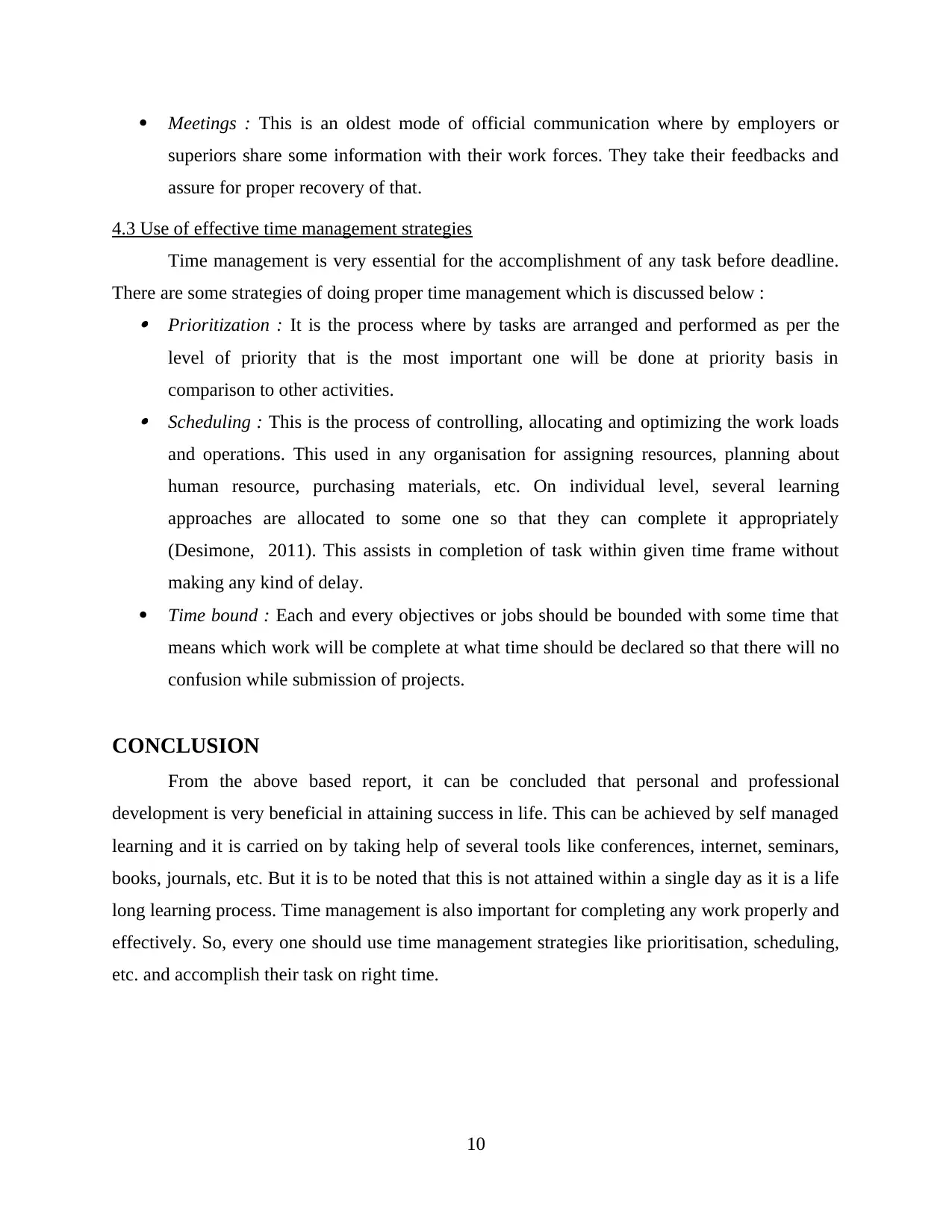
Meetings : This is an oldest mode of official communication where by employers or
superiors share some information with their work forces. They take their feedbacks and
assure for proper recovery of that.
4.3 Use of effective time management strategies
Time management is very essential for the accomplishment of any task before deadline.
There are some strategies of doing proper time management which is discussed below : Prioritization : It is the process where by tasks are arranged and performed as per the
level of priority that is the most important one will be done at priority basis in
comparison to other activities. Scheduling : This is the process of controlling, allocating and optimizing the work loads
and operations. This used in any organisation for assigning resources, planning about
human resource, purchasing materials, etc. On individual level, several learning
approaches are allocated to some one so that they can complete it appropriately
(Desimone, 2011). This assists in completion of task within given time frame without
making any kind of delay.
Time bound : Each and every objectives or jobs should be bounded with some time that
means which work will be complete at what time should be declared so that there will no
confusion while submission of projects.
CONCLUSION
From the above based report, it can be concluded that personal and professional
development is very beneficial in attaining success in life. This can be achieved by self managed
learning and it is carried on by taking help of several tools like conferences, internet, seminars,
books, journals, etc. But it is to be noted that this is not attained within a single day as it is a life
long learning process. Time management is also important for completing any work properly and
effectively. So, every one should use time management strategies like prioritisation, scheduling,
etc. and accomplish their task on right time.
10
superiors share some information with their work forces. They take their feedbacks and
assure for proper recovery of that.
4.3 Use of effective time management strategies
Time management is very essential for the accomplishment of any task before deadline.
There are some strategies of doing proper time management which is discussed below : Prioritization : It is the process where by tasks are arranged and performed as per the
level of priority that is the most important one will be done at priority basis in
comparison to other activities. Scheduling : This is the process of controlling, allocating and optimizing the work loads
and operations. This used in any organisation for assigning resources, planning about
human resource, purchasing materials, etc. On individual level, several learning
approaches are allocated to some one so that they can complete it appropriately
(Desimone, 2011). This assists in completion of task within given time frame without
making any kind of delay.
Time bound : Each and every objectives or jobs should be bounded with some time that
means which work will be complete at what time should be declared so that there will no
confusion while submission of projects.
CONCLUSION
From the above based report, it can be concluded that personal and professional
development is very beneficial in attaining success in life. This can be achieved by self managed
learning and it is carried on by taking help of several tools like conferences, internet, seminars,
books, journals, etc. But it is to be noted that this is not attained within a single day as it is a life
long learning process. Time management is also important for completing any work properly and
effectively. So, every one should use time management strategies like prioritisation, scheduling,
etc. and accomplish their task on right time.
10
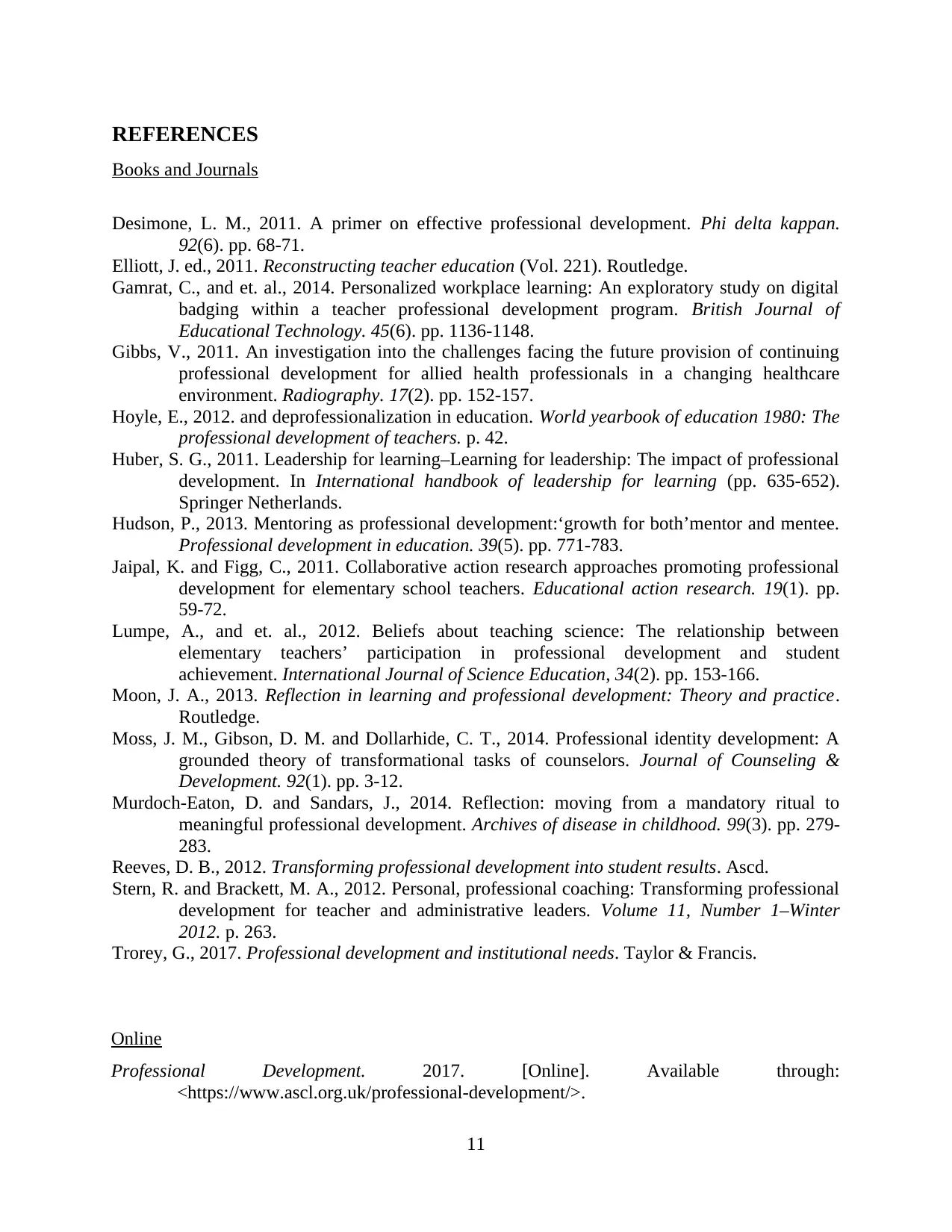
REFERENCES
Books and Journals
Desimone, L. M., 2011. A primer on effective professional development. Phi delta kappan.
92(6). pp. 68-71.
Elliott, J. ed., 2011. Reconstructing teacher education (Vol. 221). Routledge.
Gamrat, C., and et. al., 2014. Personalized workplace learning: An exploratory study on digital
badging within a teacher professional development program. British Journal of
Educational Technology. 45(6). pp. 1136-1148.
Gibbs, V., 2011. An investigation into the challenges facing the future provision of continuing
professional development for allied health professionals in a changing healthcare
environment. Radiography. 17(2). pp. 152-157.
Hoyle, E., 2012. and deprofessionalization in education. World yearbook of education 1980: The
professional development of teachers. p. 42.
Huber, S. G., 2011. Leadership for learning–Learning for leadership: The impact of professional
development. In International handbook of leadership for learning (pp. 635-652).
Springer Netherlands.
Hudson, P., 2013. Mentoring as professional development:‘growth for both’mentor and mentee.
Professional development in education. 39(5). pp. 771-783.
Jaipal, K. and Figg, C., 2011. Collaborative action research approaches promoting professional
development for elementary school teachers. Educational action research. 19(1). pp.
59-72.
Lumpe, A., and et. al., 2012. Beliefs about teaching science: The relationship between
elementary teachers’ participation in professional development and student
achievement. International Journal of Science Education, 34(2). pp. 153-166.
Moon, J. A., 2013. Reflection in learning and professional development: Theory and practice.
Routledge.
Moss, J. M., Gibson, D. M. and Dollarhide, C. T., 2014. Professional identity development: A
grounded theory of transformational tasks of counselors. Journal of Counseling &
Development. 92(1). pp. 3-12.
Murdoch-Eaton, D. and Sandars, J., 2014. Reflection: moving from a mandatory ritual to
meaningful professional development. Archives of disease in childhood. 99(3). pp. 279-
283.
Reeves, D. B., 2012. Transforming professional development into student results. Ascd.
Stern, R. and Brackett, M. A., 2012. Personal, professional coaching: Transforming professional
development for teacher and administrative leaders. Volume 11, Number 1–Winter
2012. p. 263.
Trorey, G., 2017. Professional development and institutional needs. Taylor & Francis.
Online
Professional Development. 2017. [Online]. Available through:
<https://www.ascl.org.uk/professional-development/>.
11
Books and Journals
Desimone, L. M., 2011. A primer on effective professional development. Phi delta kappan.
92(6). pp. 68-71.
Elliott, J. ed., 2011. Reconstructing teacher education (Vol. 221). Routledge.
Gamrat, C., and et. al., 2014. Personalized workplace learning: An exploratory study on digital
badging within a teacher professional development program. British Journal of
Educational Technology. 45(6). pp. 1136-1148.
Gibbs, V., 2011. An investigation into the challenges facing the future provision of continuing
professional development for allied health professionals in a changing healthcare
environment. Radiography. 17(2). pp. 152-157.
Hoyle, E., 2012. and deprofessionalization in education. World yearbook of education 1980: The
professional development of teachers. p. 42.
Huber, S. G., 2011. Leadership for learning–Learning for leadership: The impact of professional
development. In International handbook of leadership for learning (pp. 635-652).
Springer Netherlands.
Hudson, P., 2013. Mentoring as professional development:‘growth for both’mentor and mentee.
Professional development in education. 39(5). pp. 771-783.
Jaipal, K. and Figg, C., 2011. Collaborative action research approaches promoting professional
development for elementary school teachers. Educational action research. 19(1). pp.
59-72.
Lumpe, A., and et. al., 2012. Beliefs about teaching science: The relationship between
elementary teachers’ participation in professional development and student
achievement. International Journal of Science Education, 34(2). pp. 153-166.
Moon, J. A., 2013. Reflection in learning and professional development: Theory and practice.
Routledge.
Moss, J. M., Gibson, D. M. and Dollarhide, C. T., 2014. Professional identity development: A
grounded theory of transformational tasks of counselors. Journal of Counseling &
Development. 92(1). pp. 3-12.
Murdoch-Eaton, D. and Sandars, J., 2014. Reflection: moving from a mandatory ritual to
meaningful professional development. Archives of disease in childhood. 99(3). pp. 279-
283.
Reeves, D. B., 2012. Transforming professional development into student results. Ascd.
Stern, R. and Brackett, M. A., 2012. Personal, professional coaching: Transforming professional
development for teacher and administrative leaders. Volume 11, Number 1–Winter
2012. p. 263.
Trorey, G., 2017. Professional development and institutional needs. Taylor & Francis.
Online
Professional Development. 2017. [Online]. Available through:
<https://www.ascl.org.uk/professional-development/>.
11
Paraphrase This Document
Need a fresh take? Get an instant paraphrase of this document with our AI Paraphraser

12
1 out of 14
Related Documents
Your All-in-One AI-Powered Toolkit for Academic Success.
+13062052269
info@desklib.com
Available 24*7 on WhatsApp / Email
![[object Object]](/_next/static/media/star-bottom.7253800d.svg)
Unlock your academic potential
© 2024 | Zucol Services PVT LTD | All rights reserved.





